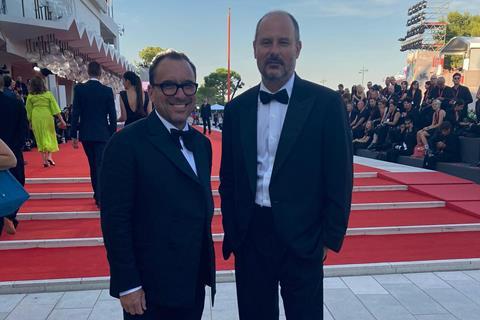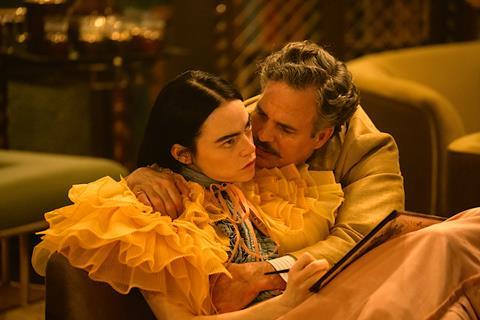
With five films playing in competition, European production and distribution group Fremantle is enjoying a strong presence at this year’s Venice Film Festival.
Fremantle’s Ireland-UK label Element Pictures is behind one of the hottest films on the Lido this year, Yorgos Lanthimos’ Poor Things, while Italian label Wildside produced Saverio Costanzo’s big budget Finally Dawn.
Another Fremantle Italian production label The Apartment, meanwhile, is involved in three films in competition – Sofia Coppola’s Priscilla , Stefano Sollima’s Adagio and Piero Castellito’s Enea.
Also at Venice, Fremantle announced an alliance with Israel-based IBI Investment House on a new €150m fund to finance a portfolio of scripted television and film projects.
Film is an important part of the mix for London-based Fremantle whose network of production companies delivered 17 features last year alongside 115 scripted series.

Christian Vesper, CEO of Fremantle’s global drama team, says film forms part of the company’s strategy to support its creative talent in whatever medium they want to work. “If you’re working with a Michael Winterbottom or Luca Guadagnino, it’s about doing their films and their TV and giving them an opportunity to have a home here. Our producers and our talent are both really energised by film and television storytelling.”
Sitting alongside Vesper in the garden of Fremantle’s villa on the Venice Lido, Andrea Scrosati, Fremantle group COO and CEO for continental Europe, gives an example. “We started our relationship with Paolo Sorrentino on [series] The Young Pope. And then he wanted to do a movie…and now Paolo is shooting for us his new movie in Naples.”
Sorrentino’s as-yet-untitled film centres on the life of a woman, Partenope, from her birth in 1950 through to today. Lorenzo Mieli for The Apartment Pictures is producing.
Another anticipated Fremantle film is Maria, a biopic of Maria Callas starring Angelina Jolie to be directed by Pablo Larrain. Set to film in Budapest in October, it is produced through Fremantle’s The Apartment Pictures as well as Larrain’s Fabula Pictures and Germany’s Komplizen Film, both of which have strong relationships with Fremantle.
Investment fund
Maria is the first feature to receive backing from the €150m IBI Investment House fund, alongside two series – revenge drama Shelter and mystery thriller Generation Loss.
Scrosati and Vesper explain that the fund can fully finance films and series, and will target projects that Fremantle is confident that there is a market for and that are looking to seize a “window of opportunity” to get made.

Vesper says the three greenlit projects so far all have strong talent attached, and explains that the fund gives Fremantle the chance to align financing with talent availability. “You miss the opportunity if you wait too long.”
Scrosati says there is a ‘tactical component’ to being able to greenlight talent-dependent projects at a time when decision making in the film and TV market has slowed down. “That window of opportunity sometimes just doesn’t match with the internal processes of the big buyers that are putting [things] on hold for the moment.”
The slowdown in commissioning also spells opportunity for a company that can greenlight projects itself. “I do believe that when there is a slight downturn, if you have a long term view, that is the moment you want to invest,” says Scrosati.
It’s a point echoed by Vesper: “Even before the strikes, people were just stopping investing in a way that is not long term – it’s not going to last. They need programming.”
Soft money will be additional to the €150m fund, adding to its firepower. “So if you are producing in Italy, there’s a 30% tax credit – that is going to be on top of the money,” says Scrosati.
He doesn’t go into detail about how the fund will work with IBI Investment Bank. “In success, they are going to be having a good return. At the same time, the talents and the producers that are going to be involved in this model will have a good return.”
Feature opportunities
Scrosati says Fremantle backs independent film not just so it can work with creatives across series and movies, but also because it has become more attractive from a business perspective.
The disruption to the traditional windowing system in wake of the Covid pandemic, he reckons, has led to “great opportunity” for companies like Fremantle.
“Every movie you do, you can finance in 1,000 different ways…you can go through the traditional theatrical window, through accelerated windows, transactional plus accelerated theatrical, direct to platform, or platform and linear – you can do everything.”
Scrosati adds: “It has led to great opportunity…but on the other hand, you have to approach every single project in a different way. The worst mistake you could make is to say, ‘we have a template.’ The thing we don’t have at Fremantle is a template – every single project is approached on a standalone basis, both in the interaction with talent and from the commercial point of view.”
He cites some of the films that Fremantle labels have in competition at Venice. “On Finally Dawn, for example, we have a strong partner with RAI Cinema and 01 Distribution in Italy. But then we kept the international rights and we are selling to FilmNation the international rights. So, we took the risk on the international component and have a partner helping us there.
“For Enea, we have Vision, the Italian distribution company, and they also have international rights. So we have done a full deal with them. That is the case also for Adagio, but with a different windowing with Sky. And obviously Poor Things is 100% Searchlight. It’s all different kind of models.”
Vesper adds that for TV series, Fremantle traditionally works with anchor broadcasters like RAI, HBO or the BBC – and then it brings other networks to the table to finance a project. On occasion, Fremantle will deficit finance through its distribution division.
€3 billion target
Part of the RTL Group, Fremantle has been on a major acquisition spree in recent years, buying producers including Italy’s Lux Vide, the UK’s 72 Films, Dancing Ledge and Label1 and Abot Hameiri, the Israeli group behind hit Shtisel. Originally known for making unscripted entertainment shows like X Factor and American Idol, Fremantle has pushed heavily into scripted backing independent features including Sorrentino’s The Hand Of God and Luca Guadangino’s Bones And All.
Famously, Fremantle is targeting €3 billion in revenues by 2025 driven by organic growth and acquistions. Will the acquisition spree continue given the downturn in commissioning and a more challenged economic environment? “I know we have done a lot in a short time. But every acquisition we have done, we have applied exactly the same logic that we apply to projects. Every acquisition is seen as a single deal, and has to be a strategic fit for us,” says Scrosati.
He adds: “This will only work with teams and labels that we believe will work in this environment. And also, you need to be sure you are not cannibalising, you’re not overinvesting in one area or genre or underinvesting. Everything we have done has been because there was a logic. It was either we were missing that component in our portfolio or we were missing that potential cultural area.”
Scrosati cites Fremantle’s investment in 2019 into Latinx-focused company The Immigrant (which produced Sofía Auza’s Mexican drama Adolfo, winner of the Crystal Bear for best film in the Berlinale’s Generation 14plus sidebar). “That was specifically because we were looking for the Latinx genre.” Vesper notes The Immigrant had three series in production last year.
Unscripted bedrock
Scrosati also stresses the importance of Fremantle’s unscripted programming to the company.
Demand for unscripted, of course, has grown recently amid reports that broadcasters and streamers are shying away from costly drama and turning to entertainment programming at a time of economic pressures.
Indeed, Scrosati notes that on the day of this interview that Fremantle Italia is launching Italia’s Got Talent on Disney+ - the first edition of the format to launch on a streaming platform in Europe.
“It’s really important for me to make the point that we could never invest what we do in scripted unless we had our unscripted business. The unscripted business is the solid component of this company, and frankly from a financial point of view, it gives us the resources that we can then invest.”

























No comments yet